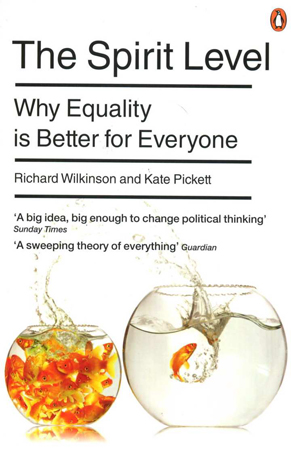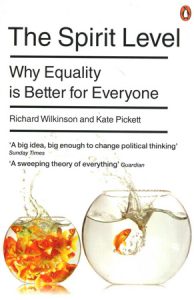Inequality and Social Anxiety
Kate Pickett and Richard Wilkinson
5th February 2017
Kate Pickett and Richard Wilkinson are Professors of Epidemiology who have collaborated for several years to investigate data relating to inequality. Their 2009 book The Spirit Level: Why Equality is Better for Everyone, which explored the effects of greater inequality within societies, became a surprise success and initiated a debate that has grown more pertinent as nations have struggled to recover from the global financial crisis. Their talk to Hebden Bridge Lit & Sci expanded on their research.
There was a time when it was felt that eliminating absolute poverty was key to improving society, but the overwhelming evidence is that it is the extent of inequality, the size of the difference between the incomes of the richest and the rest, that is at the root of failing societies. Our relative place in society gives us our sense of importance and status, and if we are low down in the hierarchy we are subject to more anxiety, stress and a sense of shame. Our sense of our own worth can effect cognitive ability – test participants who had to reveal their low caste status performed significantly worse than when this information was not made public. And the physiological effects of social anxiety have also been measured in non-human primates, where the animals lower in status had furred-up arteries and all the consequent health problems.
But it is the effects of inequality on nations that have been the main focus of the work of Kate Pickett and Richard Wilkinson. These have been measured in various ways, and the overwhelming evidence is that more unequal countries have worse outcomes across a range of areas. For example, the well-being of children is greater in societies which are more equal; there is more violent crime and higher imprisonment rates in countries which are more unequal; life expectancy is better in more equal countries, and drug and alcohol problems greater in those which are more unequal. Inequality was described as a social pollution whose effects none of us can escape from. A steeper hierarchical pyramid means a less cohesive society, where the stress effects of social anxiety can lead to a lack of trust in others and a decline in communal life, such as volunteering and caring. A society of barred gates, guards and razor wire is not a happy one.
It might be obviously in everyone’s interest to reduce these huge disparities so that we can all live in a better society, but it seems a difficult task to complete. Redistribution of wealth through taxation is one method, but one government’s decisions can easily be overturned by the next. What seems to be missing is what Professor Wilkinson described as a disciplining force against the prevailing direction of inequality – he felt this might come from a mass movement, and perhaps more workers on boards controlling remuneration, as happens in Germany. There is also the possibility of embedding measures of success other than growth in GDP – we could look for other values, such as the Sustainable Development Goals, which have been internationally agreed and can be monitored.
And on an individual level, we can seek to avoid the pressures of status consumerism by cultivating friendship – proved to be one of the biggest health benefits.
With thanks to Sheila Graham for this report

